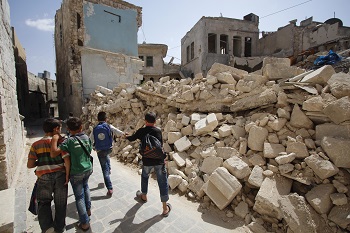School “as vital as food and medicine” for children caught up in conflict and other emergencies: EU & UNICEF
#EmergencyLessons campaign wins backing of European youth
Braving the consequences of war, natural disaster and other emergencies, nearly 2 million children in 20 countries around the world have been able to continue their schooling over the past four years as a result of a partnership between the European Commission's department for humanitarian aid and civil protection and UNICEF.

On 21 September 2016 in eastern Aleppo in the Syrian Arab Republic, Judy's schoolmates return from the first day of school passing the rubble of nearby houses. “I go to school every day, except for the times when I hear the planes,” Judy explains.
The results of the EU-supported education-in-emergencies programme were released during a public event in Brussels concluding an innovative social media-led awareness-raising campaign which sought to engage young Europeans on the issue.
“When conflict or other crises strike, children need more than food, shelter and medicine”, EU Commissioner for Humanitarian Aid and Crisis Management, Christos Stylianides, told the event at the European Parliament.
“Education can be just as much of a life-saver, providing children with a safe, protective space and helping ensure they learn the skills they need to build a better future for themselves and their communities. The EU is leading the way in its support for education in emergencies.”
Of the 462 million school-aged children and young people living in countries affected by emergencies, an estimated 75 million are in desperate need of educational support. Even so, education continues to be one of the least funded sectors in humanitarian appeals. At present, less than 2% of the global humanitarian budget goes for this purpose.
The seven-month EU-UNICEF #EmergencyLessons campaign reached more than 70 million people on Twitter alone, targeting in particular young Europeans in seven* target EU countries. Supporters were encouraged to spread the word among their peers through social media platforms, as well as at their own schools and in public events. The campaign drew on the inspirational real-life stories of children in Iraq, Ukraine, Nepal, and Guinea who continued to study despite war, natural disaster and disease outbreaks.
“Children are prepared to go to extraordinary lengths to continue their education even in the worst of circumstances,” said UNICEF Deputy Executive Director, Justin Forsyth. ”It’s up to the rest of us to make sure the necessary resources are available for them. The European Union has set an example by committing to increase the EU humanitarian aid budget to education in emergencies to 6% in 2017 and we hope others will do the same”. Christos Stylianides made the announcement at the international Education in Emergencies Forum that took place on 30 November in Brussels.
Support for the campaign came from celebrities such as British actor Tom Hiddleston, Italian European Space Agency astronaut Samantha Cristoforetti, Slovenian Basketball player Boštjan Nachbar, Hungarian news presenter and media personality Kriszta D. Tóth, and Slovakian dancer Jaro Bekr.
During the Brussels event, child and youth representatives presented their own call for stronger international support for programmes that allow children caught up in emergencies to continue their learning.
Source:United Nations Children's Fund
- 349 reads
Human Rights
Ringing FOWPAL’s Peace Bell for the World:Nobel Peace Prize Laureates’ Visions and Actions

Protecting the World’s Cultural Diversity for a Sustainable Future

The Peace Bell Resonates at the 27th Eurasian Economic Summit

Declaration of World Day of the Power of Hope Endorsed by People in 158 Nations

Puppet Show I International Friendship Day 2020

